Environmental Management System
Ecology [Strengthening of our environmental management]
- E ●
- S -
- G -
- Implementing Global Environmental Management
- Basic Policy on Environmental Preservation (fundamental philosophy)
- Eco-First Commitments
- Global Environmental Management System
- Proactive Efforts to Raise Environmental Awareness among Employees at Each Factory
- ISO 14001 Global Multi-Site Certification
- External Examinations and Internal Audits of Environmental Management
- Our Contribution to Climate Change Countermeasures as a Member of External Organizations
- Number of Environmental Accidents and Pollution and Other Incidents That Resulted in Fines or Other Punitive Measures
Implementing Global Environmental Management
- The Sumitomo Rubber Group
Environmental preservation is one of the most important responsibilities that companies must fulfill within a global society.
Demand for global companies to implement uniform environmental management throughout the world regardless of country or region is strong.
As it accelerates its global expansion, the Sumitomo Rubber Group is focusing more than ever on promoting global environmental management.
Basic Policy on Environmental Preservation (fundamental philosophy)
The Sumitomo Rubber Group established its Environmental Policy in July 2007 and revised said policy in April 2019, putting it into practice via environmental initiatives.
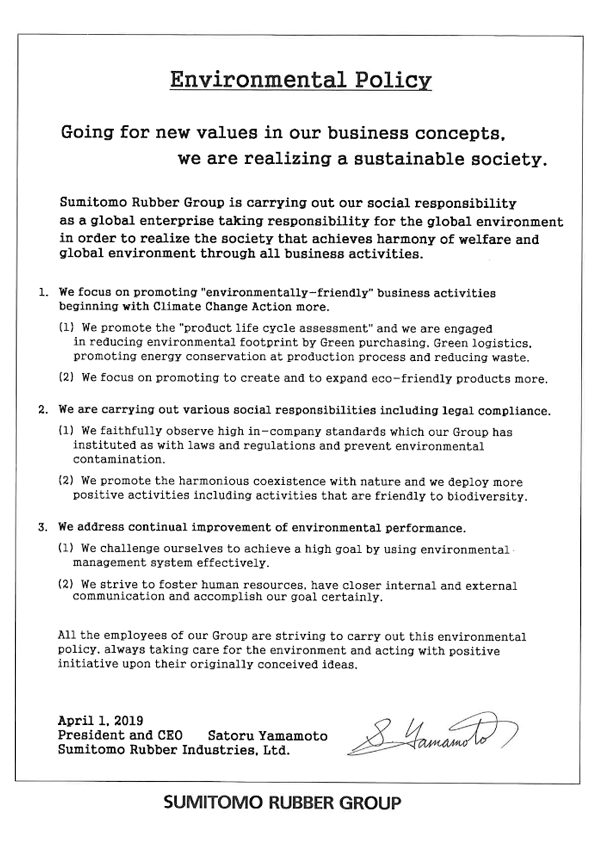
Sumitomo Rubber Industries, Ltd. Environmental Policy(PDF 68KB)
Eco-First Commitments
Eco-First Program
As a global company responsible for the environment, we will endeavor to fulfill our social responsibility in all our areas of our activity in order to achieve sustainable development of society wherein human prosperity and the environment co-exist harmoniously.
Sumitomo Rubber Industries was certified in March 2009 as an “Eco-First company” under the “Eco-First Program” established by the Ministry of the Environment, and renewed its “Eco-First Commitments,” which summarize fresh targets for environmental preservation, in October 2022.
In light of the increasing seriousness of global social issues, including climate change and other environmental concerns, we also came to the conclusion that a new policy, one based on long-term perspectives that look to the world of 2050 and beyond, would be essential to our efforts to ensure the sustained growth and development of both our group and society as a whole. The Long-Term Sustainability Policy: “Driving Our Future Challenge 2050” was thus formulated and announced in August 2021. The updated “Eco-First Commitments” include our carbon neutrality targets for 2050 (Scope 1 + 2) and other environmental targets identified by this Long-Term Sustainability Policy.
Eco-First Commitments (updated) (Japanese only)(PDF 1,289KB) Long-Term Sustainability Policy: “Driving Our Future Challenge 2050”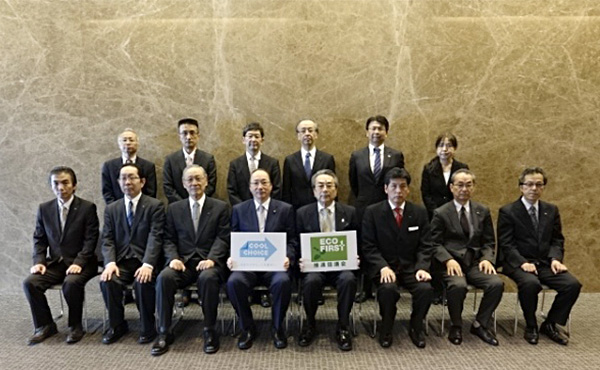
What Are Eco-First Commitments?
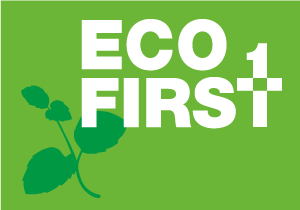
The Eco-First Commitments are commitments delivered by corporations engaged in cutting-edge, unique and industry-leading initiatives in the environmental field to the Minister of the Environment. Activities covered by these commitments include global warming countermeasures, waste reduction, resource recycling and other voluntary corporate initiatives aimed at protecting the environment.
Global Environmental Management System
- The Sumitomo Rubber Group
The Sustainability Promotion Committee meets twice a year to ensure that members share their recognition of priority issues to be tackled through sustainability activities undertaken around the globe, including environmental management, and to confirm progress in such activities. With the Director in charge of ESG serving as the committee chair, the committee includes officers responsible for relevant departments.
Environmental Management System
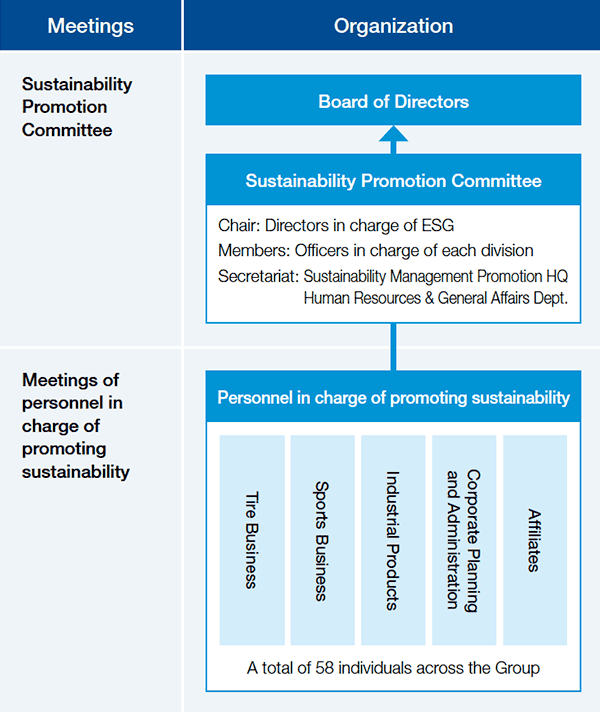
Proactive Efforts to Raise Environmental Awareness among Employees at Each Factory
- The Sumitomo Rubber Group
The Sumitomo Rubber Group is endeavoring to raise environmental awareness among its employees so that each individual can gain deeper understanding of environmental issues and proactively play their part in environmental preservation initiatives. To invigorate these initiatives across the board, in 2022 we opened “Carbon Neutral Plaza” on Sumitomo Rubber Industries’ corporate website to disseminate information regarding the status of carbon neutrality initiatives and other matters associated with the environment. Also, we have continuously encouraged employees to issue a “My Sustainability Declaration” since 2021. They are thus engaged in various sustainability initiatives on an individual basis while developing their awareness.
Each business base is similarly striving to raise sustainability awareness among employees by, for example, disseminating information through its website, hosting study sessions focused on sustainability, holding exhibitions on energy-saving best practices and displaying posters and slogans.
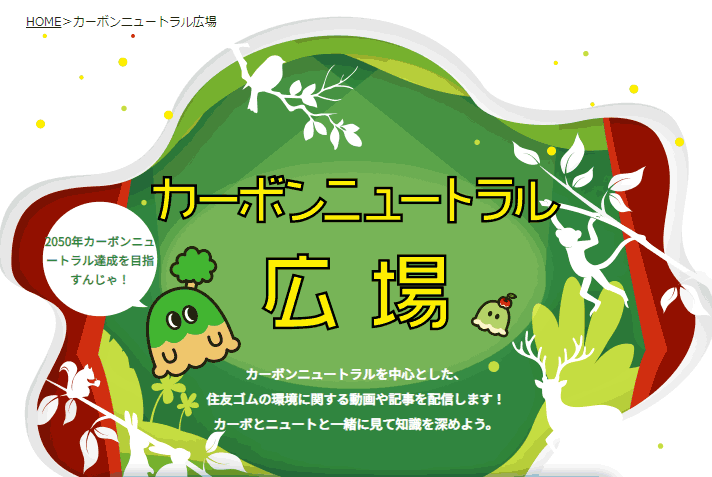
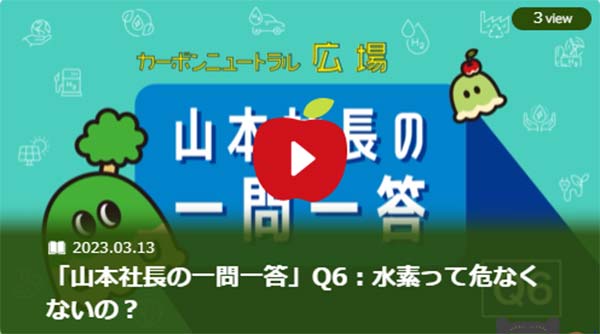
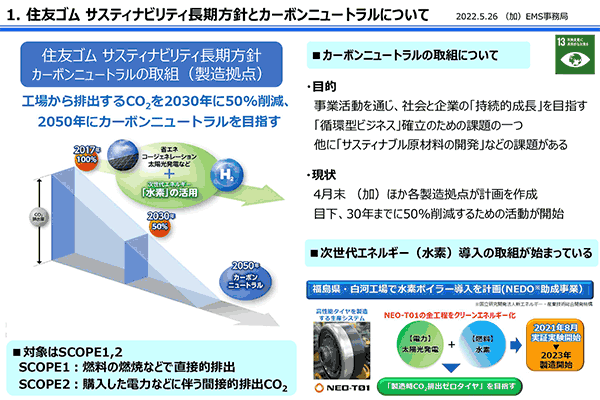
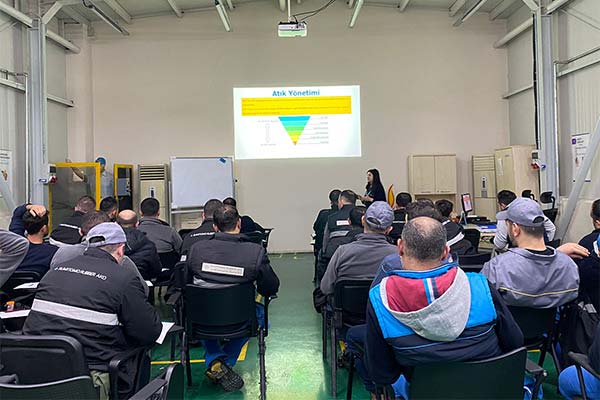
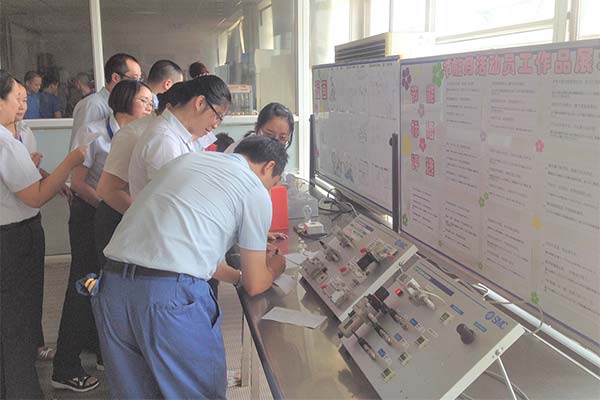
ISO14001 Global Multi-Site Certification
- The Sumitomo Rubber Group
To implement global management in all of its corporate activities, including the creation of a low-carbon society, in December 2010, the Group obtained ISO 14001 Global Multi-Site Certification for its 30 bases in Japan and overseas. This enabled us to carry out unified environmental management at major production and development bases in Japan and overseas.
The number of sites maintaining ISO 14001 certification has since risen, reaching a total of 36 at the end of 2022 (of these, 34 bases are covered by the multi-site certification). As such, the ratio of ISO 14001 certified sites amounted to 94.7%. Moreover, the number of employees working at these sites as a percentage of total employees was 74.3%.
In fiscal 2022, no sites were newly certified. However, we subjected uncertified sites to corporate audits conducted in a manner similar to those conducted at certified sites in order to strengthen our environmental management structure.
Coverage Rate of ISO 14001 Certified Sites
(Percentage of employees)
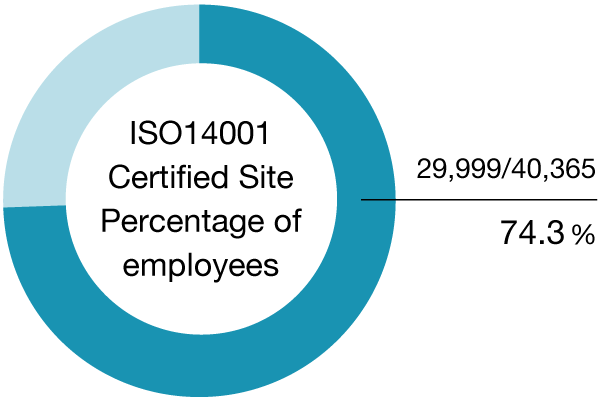
(As of December 31, 2022)
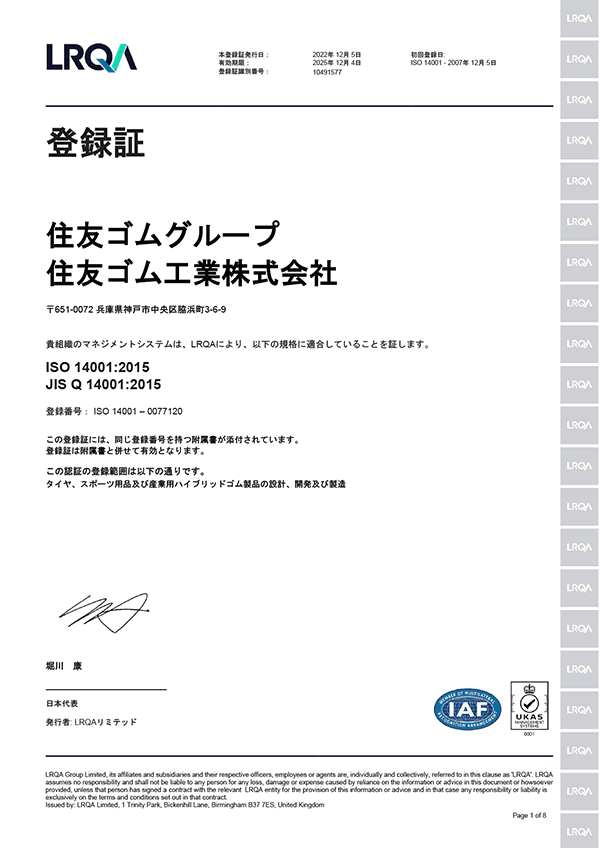
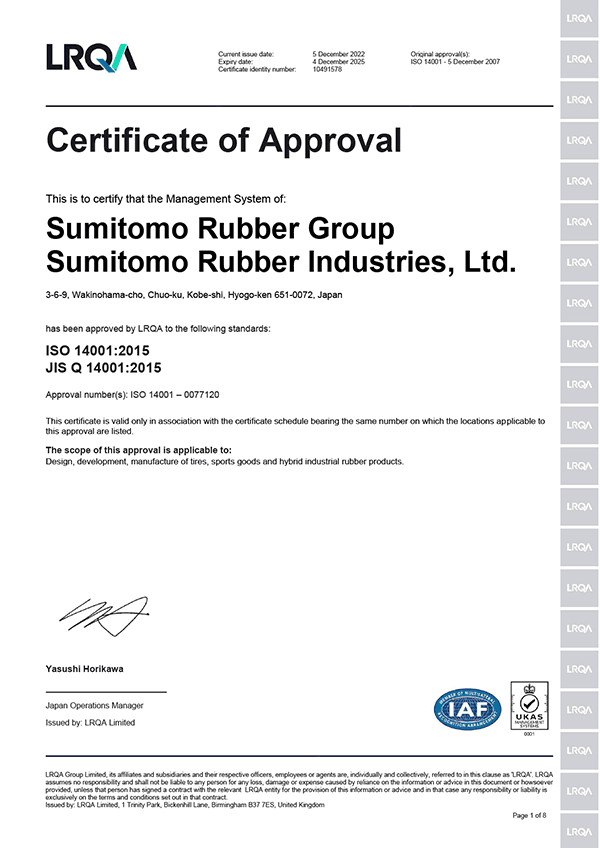
The Sumitomo Rubber Group’s Certificate for the Global Multi-Site Certification (above: Japanese version; below: English version)
Status of ISO14001 Certification
| Name of base | Year of certification | Number of employees | Ratio of employees at certified sites to the overall number of employees at production bases |
|---|---|---|---|
| Head Office and Technical Center | 2007 | 1,751 | 4.3 |
| Shirakawa Factory | 1997 | 1.315 | 3.3 |
| Nagoya Factory | 1997 | 1,075 | 2.7 |
| Izumiotsu Factory | 1998 | 305 | 0.8 |
| Miyazaki Factory | 1997 | 1,263 | 3.1 |
| Ichijima Factory | 1998 | 159 | 0.4 |
| Kakogawa Factory | 1998 | 391 | 1.0 |
| Changshu Factory, China | 2005 | 1,827 | 4.5 |
| Indonesia Factory | 2003 | 3,279 | 8.1 |
| Thailand Factory | 2008 | 6,955 | 17.2 |
| Zhongshan Factory, China | 2004 | 270 | 0.7 |
| Vietnam Factory | 2008 | 732 | 1.8 |
| Malaysia Factory | 2005 | 628 | 1.6 |
| Thailand Factory (tennis balls) | 2009 | 452 | 1.1 |
| Thailand Factory (natural rubber processing) | 2012 | 248 | 0.6 |
| Sumitomo Rubber (China) Co., Ltd. | 2013 | 190 | 0.5 |
| Hunan Factory, China | 2013 | 1,161 | 2.9 |
| Brazil Factory | 2014 | 1,782 | 4.4 |
| Turkey Factory | 2016 | 2,553 | 6.3 |
| South Africa Factory | 2012 | 1,412 | 3.5 |
| USA Factory | 2013 | 1,405 | 3.5 |
| Switzerland Factory | 2014 | 126 | 0.3 |
| Slovenia Factory | 2020 | 132 | 0.3 |
| Nakata Engineering, Ltd. | 2004 | 94 | 0.2 |
| SRI Business Associates Co., Ltd. (Kobe District) | 2009 | 21 | 0.1 |
| SRI Systems Ltd. (Kobe District) | 2009 | 176 | 0.4 |
| SRI Logistics Ltd. (Kobe District) | 2009 | 2 | 0.0 |
| SRI Engineering, Ltd. | 2009 | 136 | 0.3 |
| Dunlop Retread Service Ltd. | 2010 | 56 | 0.1 |
| Dunlop Golf Club, Ltd | 2010 | 103 | 0.3 |
| Number of employees at certified sites | 29,999 | 74.3 | |
| Overall number of Group employees | 40,365 | 100.0 | |
Note:Number of employees is as of December 31, 2022
External Examinations and Internal Audits of Environmental Management
- The Sumitomo Rubber Group
Every year, the Sumitomo Rubber Group undergoes external examinations provided by certification bodies, while employees qualified as internal auditors conduct internal audits at each business base. Moreover, since fiscal 2009, auditors from the Head Office of Sumitomo Rubber Industries, Ltd. perform corporate audits of Group manufacturing bases at home and abroad once a year in principle. In fiscal 2022, we conducted audits of all target business bases on a remote basis.
In addition, external examinations undertaken in fiscal 2022 revealed that all business bases earned favorable ratings, enabling them to renew Global Multi-Site Certification for ISO14001: 2015.
Moreover, no serious violations of environment-related laws and regulations were detected via external examinations or internal audits.
Hours Spent Performing External Examinations and Internal Audits (including corporate audits)
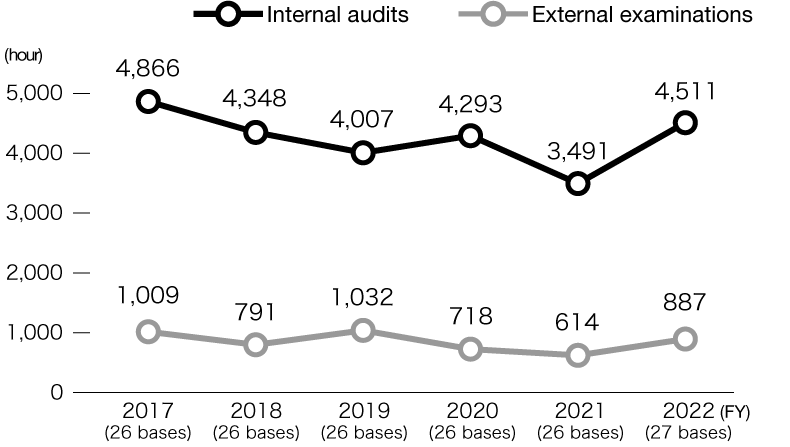
Our Contribution to Climate Change Countermeasures as a Member of External Organizations
Initiatives as a Member of the Japan Hydrogen Association
Sumitomo Rubber Industries, Ltd. has been a member of the Japan Hydrogen Association since February 2021. As part of this association, we aim to achieve net zero emissions (carbon neutrality) in terms of CO2 emissions from our manufacturing process by 2050. To this end, we are striving to utilize hydrogen-fired energy, a CO2-free energy source for the next generation. Through our membership in the Japan Hydrogen Association, we are involved in the advancement of climate change countermeasures by lobbying for, and delivering proposals regarding, the creation of a government-sponsored framework for the widespread utilization of hydrogen and the enhancement of relevant national budget.
Furthermore, our efforts to utilize hydrogen include verification testing undertaken at the Shirakawa Factory, our mainstay tire production facility based in Fukushima Prefecture, with the aim of switching the fuel used to produce steam, which is essential to the tire manufacturing process, from fossil fuel to hydrogen. This verification testing has been under way since August 2021 and is expected to continue until March 2024.
Number of Environmental Accidents and Pollution and Other Incidents That Resulted in Fines or Other Punitive Measures
In fiscal 2022, the Sumitomo Rubber Group recorded no environmental accidents or pollution or other incidents that resulted in fines or other punitive measures.